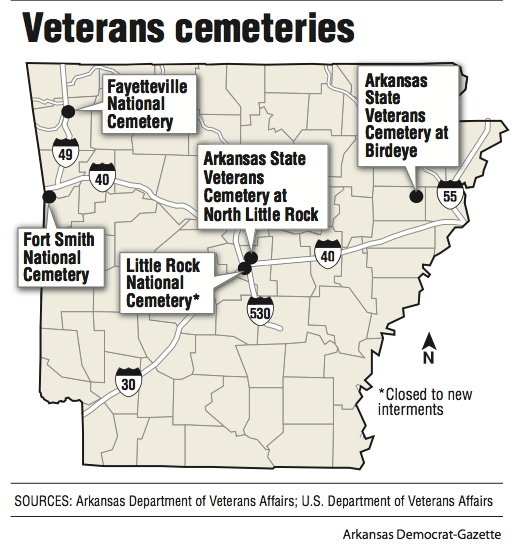The federal government buried sailor Charles Duncan last summer at Fort Smith National Cemetery without his wife or daughter by his side.
It frustrated and confused his family, which had no way to make the 150-mile trip to Fort Smith. Worsening matters, the Arkansas State Veterans Cemetery at North Little Rock was only a short drive from the family members' central Arkansas homes and had ample burial space.
A quirk, perhaps an oversight, in federal law mandated that if the U.S. Department of Veterans Affairs was to cover Duncan's funeral costs, he must be laid to rest at a national cemetery -- not one of the veterans cemeteries under state control.
"We didn't have the means, and if you don't have the money, you just get put on the back burner," Duncan's daughter Johnnie Lollis said.
A bill introduced Monday by U.S. Sen. Tom Cotton, R-Ark., may shield other families from undergoing the hardships Duncan's family faced last year.
The Charles Duncan Buried with Honor Act would expand the scope of a 2012 act that extended the coverage of funeral costs for indigent veterans. The new act would allow them to be buried at state veterans cemeteries instead of just national cemeteries as the law currently allows.
For example, a veteran with little money or no family members from West Memphis could be buried at the Arkansas State Veterans Cemetery at Birdeye in neighboring Cross County, rather than in a national cemetery across the state.
Matt Snead, director of the Arkansas Department of Veterans Affairs, approached Cotton's office with the matter, which appeared to have been simply overlooked in 2012.
"It's a small gap in federal law, but it's a significant one," Cotton said, adding that the U.S. Senate has received the bill well. The bill was sent to the Senate Committee on Veterans Affairs, and Cotton hopes it can be tacked to another bill and passed by the end of 2016.
There are five veterans cemeteries in Arkansas -- two run by the state and three under federal control.
The state cemeteries in Birdeye and North Little Rock both have available grave space. Little Rock National Cemetery is at capacity, but Fayetteville National Cemetery and Fort Smith National Cemetery are open to new interments.
The U.S. constructed its first national cemetery in 1862 to accommodate the large number of Civil War casualties, according to the U.S. Department of Veterans Affairs. Today, it maintains 134 national cemeteries.
States started operating their own veterans cemeteries 38 years ago after the creation of the State Cemetery Grants Program, which was formed to target areas in need of veterans cemeteries, according to the VA.
Typically, the VA covers burial expenses, including a grave site, interment, perpetual care, a government headstone, a burial flag and a Presidential Memorial Certificate. The veteran and his family are left with any other costs of the funeral and a coffin.
Under the current law, the VA also will pay $2,421 for coffins or $244 for urns for indigent veterans when they are buried in a national cemetery.
Indigent veterans are somewhat rare, according to Little Rock Funeral Home owner Brad Leggett, but the process can be difficult for families like Duncan's. Leggett estimated that his funeral home has handled the arrangements for 100-200 indigent veterans in the past decade.
The bill is a "common-sense" measure that won't add any costs and, in some cases, may reduce the expenses to taxpayers, Snead and Cotton agreed.
"This is not going to make or break the bank," Snead said. "It's just common sense and the right thing to do for these families."
Metro on 06/22/2016

